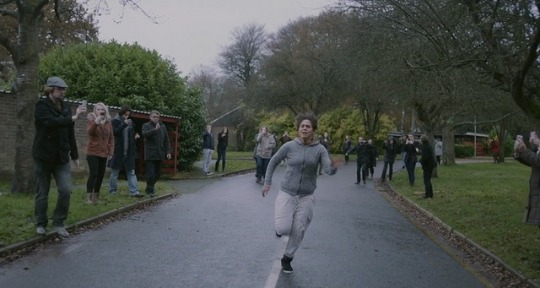 |
| Via Tumblr |
21 Days of Spooky is not about pop culture that sets out to fright you with brain-eating, viscerae-hanging, slash-killing scenes, but with thoughts that linger and persist on your life long after you've watched them. Or are just downright creepy. Tonight's spooky: Black Mirror's "White Bear". Some spoilers ahead.
What's it about?: A woman wakes up with no recollection of who she is nor why she's there, only to discover she's being chased by murderous figures and constantly chased by bystanders who only take pictures and record video with their phones instead of helping her.
I'll start by highlighting that this is probably one of the Days of Spooky entries nearly all of you have watched already, but for the sake of the feature, I'll try to remain mum on the episode's ending, not only for the sake of spoilers, but also because social revenge is not necessarily the topic that I find scarier (amazingly) on this episode. Nonetheless, the spooky topic does apply to the plot pre-and-post big reveal, so (white) bear with me on this one.
What is it with us human beings and this voyeuristic obssession with picturing and recording everything that goes on? People back in timey-wimey times would have artists paint them, after cameras were invented even corpses would get propped up to get a lasting pic! Only for what, remembrance? "Oh, here's a portrait of my asshole uncle Chuck" "Ha! Found a pic of the corpse of my aunt Marina!" Even if it was to remember as you're old, once you lose your faculties you won't remember the dog shitting in the grass on that photo in your hands is good ol' Spud who died back in '93 of old age.
Yes, call me cynical, but that literally devolved into this current digital obssession with capturing whatever event that comes to mind for the shits and giggles, essentially. We film a dude being wheeled into an ambulance after he crashed his bike into a semi, why? We'll show that video around for one-two days, then forget about it until our phone's memory overclogs with all the digital dump and we delete it because we want space, in case we need to film a dude being mauled by a genetically enhanced T-rex. We contributed nothing but a lack of help, and didn't even get to actually live the situation.
Oh, fantastic, let's kidnap a little girl, and after we do, I'm gonna film her saying adorable stuff while tricking her we won't do anything to her poor soul, and to boot I'm gonna film as she's killed and set on fire! Why? Because I'm a stupid psychopath! Let's chase after a woman who's being pursued by masked assailants instead of helping, because we're social revenging and also because we'd totally do it anyways without a single goshdarn excuse! It's the digital evolution of Nightcrawler's Lou Bloom, but even shittier as there's no monetary reward waiting for us in the end (maybe clicks? Social media followers?).
This episode came to Charlie Brooker's creation while filming Dead Set. There's was this scene in where Riz Ahmed's character was being chased by zombies, a couple of kids showed up and started taking pictures on their phones, not intervening, just stood there like traffic lights, snapping at something they didn't know anything about. That event gave Brooker the idea of making an episode for that very show about a viral photo that turned people into what he called "voyeurs of agony".
Alas, that's what eventually happens to Victoria (Lenora Crichlow) on "White Bear". As she screams, runs, and begs for help, she's tailed by bystanders who point at her with their devices; according to the first half-or-so of the episode it's because of a signal that makes people that blank. But we know that in the real world there's no such signal. Put yourself in the place of a victim of an accident, for example. Would you rather have someone help you, or have somebody film your pain? If you're already being helped, do you need the reminder that someone's snatching your picture for its digital benefit?
The best part is that with "White Bear" we're voyeurs of agony as well. We're watching a confused Victoria suffer and, while we may feel sad for her initially, we don't help, we just watch, we feel her pain viscerally, we follow her non-stop as she tries to save herself, like a predator to its prey. At least this is fiction, though. But give the "voyeur of agony" concept a thought the next time you see an online video of a car crash, open-air shootout, or whatever gnarly thing somebody recorded instead of helping.
Tomorrow: There's no family like resentment family in José Martínez Suárez's Yesterday's Guys Used No Arsenic.
No comments:
Post a Comment